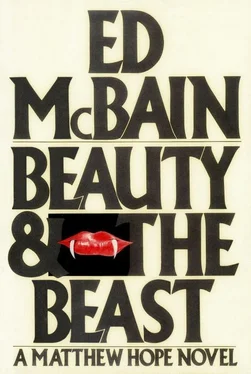Early in August last year, a cruising Calusa cop had noticed a car parked on the access road to the airport. The time was 6:00 A.M. The cop made a pass at the car, noting the license-plate number, and then radioed in for a check with Tampa. The message came back to him that the car was a stolen one. He drove around past the airport and then back onto the access road again, where the reportedly stolen car was still parked, the driver slumped over the wheel, his head on his folded arms. The cop drew his gun, rapped on the window, and asked the driver for his license and identification. The driver rolled down the window, said, “Leave me alone,” and then — as an apparent afterthought — reached over to thumb open the glove compartment. The cop shot him twice in the head.
The rest of the story, as it was later revealed — and as I recalled it now because the subsequent hearing caused quite a stir in Calusa’s legal community — was that the slain man was the owner of a carpet-cleaning business on US 41, and that he’d been informed the night before of his sister’s death. The sister lived in Chicago; he was driving to the airport to catch an early-morning flight out. But, apparently grief stricken, he had pulled over to the side of the airport access road, and was weeping, slumped over the wheel, when the cop approached. The stolen-car report from Tampa had been erroneous; the car belonged to the man driving it. But the cop, believing he was dealing with a criminal, automatically assumed the man was reaching into the glove compartment for a weapon. The story had an unhappy ending: the cop was exonerated of all charges against him. But the front page of a sixteen-month-old newspaper was framed and hanging behind glass on Sally Owen’s bedroom wall, together with her priceless collection of representational art.
I did not know what I’d expected to find here. Perhaps proof that George Harper couldn’t possibly have killed her. It seemed to me that I hadn’t found very much. The cop outside was smoking a cigarette when I came out of the house. Apparently, he still believed I was from the State’s Attorney’s Office; he ground out the butt the moment he saw me.
“Get what you need?” he asked.
“Thanks,” I said.
Bloom was waiting for me at the Harper house down the street, sitting in a Calusa Police Department car, a white Calusa cop at the wheel. He opened the door on the curb side as he saw me coming down the street, and then extended his hand as I approached.
“See the house?” he asked.
“Yes,” I said, “thanks.”
“What’d you make of the paintings?”
“Lousy,” I said.
“For sure. Sally did them herself.”
“How do you know?”
“Didn’t you go in the garage?”
“No.”
“Easel set up in there, unfinished painting on it, long table with tubes of paint and a palette. Neighbor on the left — the woman who found the body — says Sally was all the time painting up a storm.”
“What’d the painting in the garage look like?”
“Same as the others. Terrible.”
“I mean the subject matter.”
“A pair of Dalmatians. The dogs you see around all the firehouses. Had her inspiration on the worktable, a photograph clipped from a newspaper. By the way, what’d you think of that newspaper on her bedroom wall?”
“I don’t know. I guess the incident meant a lot to her.”
“Oh, sure. Son of a bitch shoots and kills a guy headed for a funeral, if I was a black man in this town I’d have burned down the police station. Had it framed, huh?” Bloom said. “Nice piece of glass over it. To remind her, I guess. Everything there in black-and-white where she could read it whenever she put on her lipstick. Why do you suppose she kept that mattress on the floor?”
“Why are you asking me all these questions?”
“Thought you might have some insights.”
“Not a one.”
“King-sized water bed could sleep the Russian army. So why did she need a mattress on the floor?”
“I have no idea.”
“Me neither. Things like that bother me. Don’t they bother you?”
“What bothers me is that black businessman who was killed by a trigger-happy cop. That’s what bothers me.”
“Bothered her, too, apparently.”
“Sally Owen didn’t have a client on the run out there.”
“Well, maybe that’ll change after you go on television. I set it all up, by the way. You have to be at WSWF at five-thirty, you know where it is?”
WSWF was Calusa’s own Channel 36, the “SWF” in the call letters standing for Southwest Florida. I did not know where the station was; I told Bloom I did not know where it was. I was still feeling rotten, only now the lightheadedness had dissipated and only the crankiness remained.
“Two miles east of Spinnaker, on Old Redford,” Bloom said. “Immediately on your left, you’ll see a white building with a dish antenna on top of it. You’ll be going to Tampa right after you do your number here, so maybe I ought to have somebody drive you both places, wait for you outside, is that all right with you?”
“That’s fine,” I said.
“You seem very perturbed today,” Bloom said.
“I am.”
“So am I. There’s a lot I don’t like about this case, Matthew, I’ll be honest with you. That’s one of the reasons I’m eager to get Harper back in, few more questions I’d like to ask him. Like, for example, how could he have been so fucking stupid ? I mean, once okay, I can accept that. You kill somebody, you forget to wipe your fingerprints off the murder weapon, okay. But twice ? Even a trained flea knows enough to wipe off his fingerprints. Doesn’t that bother you, Matthew?”
“It bothers me.”
“Me, too.”
“We’re on opposite sides of this one, Morrie.”
“Who says? I want to make sure we’ve got the right customer. I don’t like shooting fish in a barrel, and I don’t like frying innocent people in the electric chair, either.”
“So now you think he’s innocent, huh?”
“I’m not saying that. On the evidence, we had to arrest him and charge him. But he’s not guilty until a jury says he is. That’s the way it works, right, Matthew?”
“That’s the way it’s supposed to work.”
“That’s the way I’d like it to work,” Bloom said. “Otherwise I picked the wrong job. I’m not eager to pin a rose on your man unless he actually killed those two people. There are things that bother me, like I said. I want some answers from him. Do your best tonight, will you? Convince him to come in.”
“I’ll try.”
“Okay. You want to see this garage, or not?”
We walked up toward the Harper house. It was similar to Sally Owen’s house down the street, obviously built by the same contractor, but it was painted gray rather than white and there was no fence around it, a low line of shrubs defining the property instead. Bloom pulled a key ring from his pocket. “Had to sign a receipt for these, can you imagine? A police officer,” he said, and shook his head. “I had to take the whole ring ’cause I don’t know which of these is for the house. Guy’s got more keys than a jailer.” He tried several keys on the garage-door lock, finally found the one that fit, unlocked the door, and then reached down to yank on the handle. The door rattled up over our heads.
The garage, in contrast to Lloyd Davis’s in Miami, and considering the fact that he and Harper were in virtually the same business, was a model of neatness. Here, too, every inch of floor and wall space was covered with merchandise Harper presumably hoped to sell, but whereas Davis’s garage and its adjacent lawn and driveway areas had been a cluttered, jumbled mess, Harper’s garage gave the impression of a carefully catalogued storeroom. Radios were with radios, picture frames with picture frames, plumbing fixtures with plumbing fixtures, everything with its mate or mates, a veritable Noah’s ark of organization. Alongside one wall was a rack hung with women’s dresses and topcoats on wire hangers. Adjacent to it, on the same wall, was a rack bearing men’s suits and sports jackets. Used books were arranged in alphabetical order, by title, in a corner bookcase. Old magazines were stored in cardboard cartons onto which Harper had hand-lettered (and often misspelled) their different names: NEW YORKER, NATIONAL GRAPHIC, LADY’S HOME JOURNAL, HARPER’S BAZAR, TIME, PLAYBOY. Even Harper’s personal workbench was backed by a large piece of pegboard fastened to the wall and painted with the outline of each tool hanging on it, undoubtedly his personal possessions and not for sale. Conspicuously absent was the hammer that should have been hanging over the painted outline on the board.
Читать дальше












